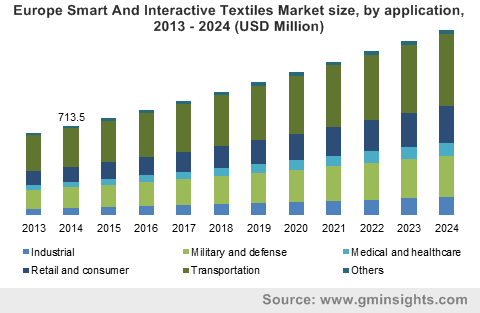Smart and Interactive Textiles Market revenue to triple by 2024, Asia Pacific to be a key revenue contributor
Publisher : Fractovia | Published Date : 2017-05-11Request Sample
Smart and Interactive Textiles market is forecast to witness a prominent growth subject to the product’s widespread applications in retail & consumer, sports, industrial, transportation, medical, and military & defense sectors. Specialty textiles help regulate the body temperature of sports persons who undergo rigorous training activities on a daily basis, and thus help in elevating the performance of the athletes, owing to which smart and interactive textiles market from sports applications will witness a rapid surge over the next few years. In addition, the growth of the sports apparel market, which accrued a revenue of USD 100 billion in 2015, is also expected to influence the industry trends. Of late, manufacturers have also been launching sensor equipped clothes for athletes pertaining to safety concerns, to provide new dimensions to the global business. According to Global Market Insights, Inc., “Smart and Interactive Textiles Industry size, worth USD 2 billion in 2015, is set to hit USD 6.5 billion by 2024.”
Transportation applications, which contributed to a revenue of more than USD 750 million in 2015, is likely to amass a share of over USD 1.5 billion by 2024. Escalated use of lightweight and comfortable fabrics in railway coaches, vehicles, ships, and aircrafts is expected to influence the revenue. Rise in the sales of personal cars will also generate heavy demand for the product across the transportation sector, thereby stimulating smart and interactive textiles market.
Europe Smart And Interactive Textiles Market size, by application, 2013 - 2024 (USD Million)

Smart and interactive textiles market revenue from medical & healthcare applications is projected to hit USD 450 million by 2024. Rising preference for smart clothing for hospital beds, bandages, and gowns along with the increasing use of sensor equipped fabrics by doctors will spur the growth of smart and interactive textiles industry. Most of the developed countries have introduced telehealth monitoring programs with sensor equipped smart clothing for heart patients to restrict hospital readmission charges, thereby propelling smart and interactive textiles market.
Rising concerns regarding employee safety along with the product’s ability to adjust to ambient weather conditions will spur smart and interactive textiles industry size from industrial applications. High rate of industrialization in the Asia Pacific region coupled with strict implementation of legislations by the government for increasing the safety of the workers working in mine fields will result in the expansion of regional smart and interactive textiles market.
North America smart and interactive textiles industry size, which was estimated at USD 700 million in 2015, is foreseen to experience a massive growth in the future. U.S. smart and interactive textiles market is expected to drive the regional revenue, owing to high fund allocations for the purchase of apparels & military equipment along with extensive financing for medical research activities.
Asia Pacific smart and interactive textiles market size is anticipated to grow at an annual rate of 20% during the period of 2016 to 2024. The growth can be credited to the rise in the industrial establishments in the region coupled with an increase in the automobile sales of emerging regions such as China, India, South Korea, and Japan.
Chromic materials and wearable electronics are the key products of smart and interactive textiles. As per surveys, most of the tech-savvy population and sports fans prefer wearable electronics due to their effective device connectivity features. Integration of the product with actuators and sensors helps in the measurement of the body metabolism of army personnel, motorcycle racers, and sportspersons. Wearable electronics, which dominated the product landscape in 2015, are expected to make significant contributions towards smart and interactive textiles market share over the years ahead.
Chromic materials are forecast to contribute notably towards smart and interactive textiles industry size over the next few years, owing to high product demand across the developed economies. The product’s ability to change colors to counter the hazardous effects of the exterior stimuli such as liquid media, pressure, gas media, power supply, heat, and light will further boost the revenue.
Smart and interactive textiles industry is extremely fragmented with top five manufacturers contributing to less than 20% of the overall revenue in 2015. Market players are trying to focus extensively on product development and R&D activities to improve their product portfolio as well as industry position.
Schoeller Textil AG, AiQ Smart Clothing Incorporation, Indorama Ventures Public Company Limited, Koninklijke Ten Cate NV Company, Toray Industries Incorporation, Globe Holding Company LLC, E. I. du Pont de Nemours and Company, Sensoria Incorporation, Milliken & Company, Outlast Technologies LLC, Textronics Incorporation, and Interactive Wear AG are the major participants of smart and interactive textiles industry.